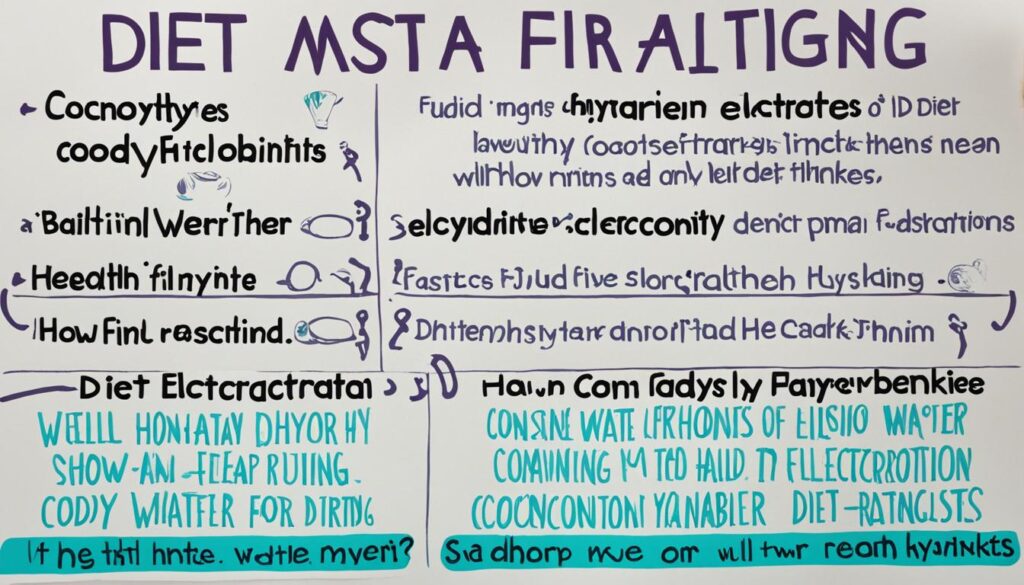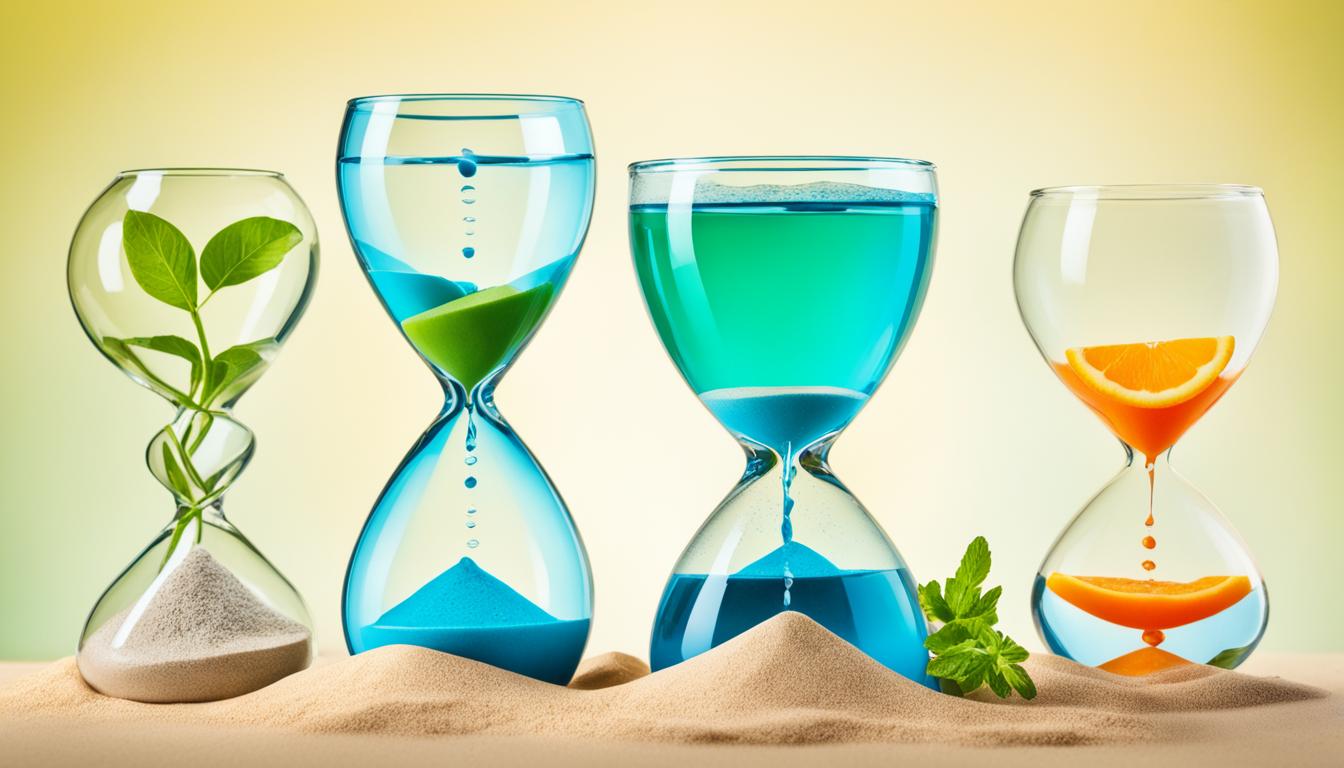Understanding diet fasting can be hard, especially knowing what’s allowed when you fast. You can drink water in most fasts, but rules change based on the fast’s kind and purpose. Intermittent fasting, for instance, lets you have water because it doesn’t raise blood sugar or insulin. It’s actually advised to drink water while fasting to stay hydrated and lower the risk of getting dehydrated.
But, different fasting methods mean different rules. Dry fasting, for instance, means no food or water for a specific time. For those doing calorie restriction or on keto diets for metabolic health, keeping track of water and staying hydrated is key. Sometimes, you might need electrolyte replenishment to stay properly hydrated and healthy throughout your fast.
The Importance of Hydration During Intermittent Fasting
Staying hydrated is key during intermittent fasting for your health and well-being. Hydration is important for body temperature, blood volume, and brain function. It also helps in digestion and getting nutrients to all parts of the body.
How Intermittent Fasting Affects Fluid Balance
Intermittent fasting changes how your body uses fluids. By not eating for certain hours, your body uses stored energy which leads to water loss. Also, not drinking enough while fasting can make dehydration and imbalance of electrolytes more likely.
Dry fasting, where you don’t even drink water, is not safe unless a doctor is checking on you. This method can cause serious dehydration and other health issues.
Water Intake Guidelines for Intermittent Fasting
Start your day by drinking water if you’re on intermittent fasting. This helps replace the fluids you lost during sleep. Drinking water and other noncaloric drinks all day keeps you balanced and prevents dehydration.
You can drink the following during your fasting periods:
- Black coffee
- Unsweetened tea
- Flavored water
- Sparkling water
- Lemon water
But, it’s not just about what you drink. Foods with lots of water like fruits and veggies also help keep you hydrated. Including these foods in your meals is a good idea for overall health.
| Beverage | Intermittent Fasting | Medical Fasting |
|---|---|---|
| Water | Allowed | Allowed up to 2 hours before procedure |
| Black Coffee | Allowed | Allowed up to 2 hours before procedure |
| Unsweetened Tea | Allowed | Allowed up to 2 hours before procedure |
| Bone Broth | Allowed in longer fasts | Not allowed |
| Fruit Juice | Not allowed | Pulp-free juice allowed up to 2 hours before procedure |
Hydrating is crucial, yet remember not to drink too much. Too much water can lower your blood’s sodium levels and cause nausea. Drink when you feel thirsty and check your urine color to stay well-hydrated.
Dehydration Risks During Religious Fasting Periods
During religious fasts, like in Ramadan or Lent, not drinking enough water can be risky. When people avoid food and drinks for a long time, they might lose balance in their body’s fluids and electrolytes. Knowing about these risks and how to stay hydrated is key to fasting safely.

Challenges of Ramadan Fasting and Hydration
Ramadan fasting means not eating or drinking from sunrise to sunset, which can be over 16 hours. In hot places, people lose more water from their bodies through sweat. This can easily lead to dehydration.
A 2013 study talked about how over 200 people lost weight and had lower BMI values after 20 days of fasting. But, the weight loss might mostly be from losing water. So, drinking enough water when they can helps fasters stay healthy and hydrated.
Strategies for Maintaining Hydration During Ramadan
For Ramadan, it’s important to drink enough water when it’s allowed, like before dawn and after sunset. Water is the best drink because it helps the body hold onto water better than drinks with sugar or caffeine. Taking electrolyte tablets can help too, by replacing minerals lost in sweat and pee.
When it’s time to eat, choose foods with a lot of water. Foods like watermelon, cucumbers, and apples are good. They add to your total water intake.
Lent Fasting and Fluid Intake Considerations
Lent fasting is different for each Christian group, but some give up certain foods or drinks. Even though not all fasting periods ban drinking fluids, it’s wise to drink enough water every day. Watching your urine can tell you if you’re drinking enough. Light yellow means you’re well-hydrated, but dark yellow means you might be dehydrated.
Fasting has complex effects on the body. A 2012 study found that certain inflammation markers were at their lowest point during Ramadan dry fasting, which could be good. And, Ramadan fasting changes blood sugar levels, calories burned, and body composition differently for men and women.
Knowing the risks of dehydration during religious fasts and how to avoid them is crucial. By managing their hydration well, people can fast safely without health issues from imbalanced fluids and electrolytes.
Hydration And Diet Fasting: Balancing Fluid and Electrolytes
During diet fasting, keeping up with hydration and maintaining a good electrolyte balance are key. It’s not just about how much water you drink. Understanding what electrolytes do is vital too.
Electrolytes like sodium, chloride, and more control our body’s fluid levels. They help our systems work correctly.

The Role of Electrolytes in Hydration
Electrolytes are minerals in our body fluids. They can carry electrical charges. These charges help with muscle action, brain signals, and keeping our fluids balanced.
Losing electrolytes happens, especially when fasting and being active in hot weather. To keep our body working well, it’s important to replace these lost electrolytes.
Signs and Symptoms of Electrolyte Imbalances
If you’re fasting, knowing the signs of too few electrolytes is important. You might notice muscle issues, feeling tired, or even heart irregularities.
Other signs include not feeling well, like being dizzy or confused, or having an upset stomach.
Dehydration and low electrolytes can hurt how our brain works. This is especially true for older people and athletes. A study in 2004 linked doing well mentally with being well hydrated.
Choosing Electrolyte-Rich Foods and Beverages
Including foods and drinks rich in electrolytes as you end your fast is crucial. There are many good places to get electrolytes from, like:
| Electrolyte | Food Sources |
|---|---|
| Sodium | Sea salt, pickles, olives, celery |
| Chloride | Table salt, seaweed, rye, tomatoes |
| Calcium | Dairy products, leafy greens, almonds, sesame seeds |
| Potassium | Bananas, avocados, spinach, potatoes, coconut water |
| Magnesium | Nuts, seeds, leafy greens, whole grains, dark chocolate |
For a quick boost, sports drinks or electrolyte supplements work well. Make sure to pick ones that offer a mix of electrolytes that match your needs. Talking to a doctor is a smart move too.
By focusing on staying hydrated and watching our electrolytes, we can stay healthy during diet fasting. This approach also helps keep our thinking sharp and dodges issues related to fluid and electrolyte troubles.
Optimizing Hydration for Weight Loss and Metabolic Health
Many folks use intermittent fasting to jumpstart weight loss and improve metabolism. A study review suggests it works just as well as cutting calories alone for losing weight. But, it helps keep more muscle, which is key for a fast metabolism and avoiding the dieting slow down.
Intermittent fasting isn’t just about the timing of meals, but also what you eat. Eating nourishing, whole foods and staying hydrated are crucial for its weight loss and health benefits. This approach changes how you eat and can make you healthier.
Fasting and drinking enough water are essential for weight loss and health benefits. Here are some ways to keep hydrated while fasting:
- Drink plenty of water during your eating periods
- Eat foods high in water content, such as fruits and veggies
- Try electrolyte drinks or supplements for extra hydration if needed
- Limit coffee and alcohol, since they can dry you out
Pairing fasting with good hydration and eating the right foods can lead to lasting health changes. The real trick is to find what fasting plan works best for you.
| Intermittent Fasting Benefits | Hydration Strategies |
|---|---|
| Promotes fat loss while preserving muscle mass | Drink water throughout eating windows |
| Helps establish anti-grazing rules and reduce mindless snacking | Eat foods with high-water content like fruits and vegetables |
| May improve markers of metabolic health, such as insulin sensitivity and inflammation | Try electrolyte drinks or supplements to stay hydrated |
| Can be adapted to individual lifestyle preferences and needs | Watch out for dehydration from too much caffeine or alcohol |
Conclusion
Keeping hydrated is important when fasting, whether for health or religious reasons like Ramadan and Lent. It helps keep your body balanced, your electrolytes in check, and your overall health good when eating less. You should drink lots of water, eat foods with high water content, and maybe add electrolytes if needed. A study in 2022 showed that fasting with only water for 10 days helped lower weight, BMI, and blood pressure. Yet, half of the people quit due to side effects. This shows how vital it is to stay hydrated and have a doctor monitor you during long fasts.
Staying hydrated is also key to getting the most out of fasting for your health. Research suggests fasting can help control blood sugar and lower bad blood fats. It might even be good for your brain. One type of fasting called time-restricted eating lets you eat only in certain hours. But, we’re not sure of its long-term benefits yet. The Big IF Study is looking into this. It’s already showing that people have more energy, better digestion, feel less bloated, and lose weight.
Knowing how important water is and using smart ways to stay hydrated can make fasting safe and effective. But, it’s crucial to watch out for the risks of dehydration, especially for the old and the young. Always talk to a doctor before you start a fasting plan. They can make sure it won’t harm you, especially if you have health issues. This way, you can fast safely and reach your health goals.




